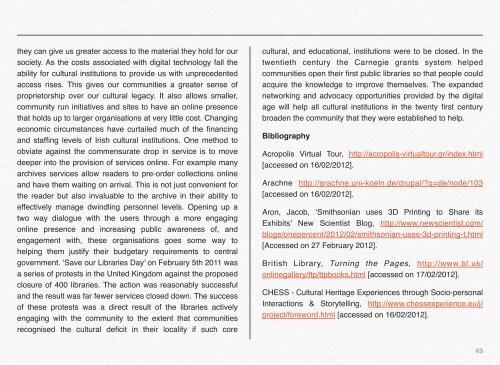Digital Arts & Humanities - Scholarly Reflections - James O'Sullivan
Digital Arts & Humanities - Scholarly Reflections - James O'Sullivan
Digital Arts & Humanities - Scholarly Reflections - James O'Sullivan
You also want an ePaper? Increase the reach of your titles
YUMPU automatically turns print PDFs into web optimized ePapers that Google loves.
they can give us greater access to the material they hold for our<br />
society. As the costs associated with digital technology fall the<br />
ability for cultural institutions to provide us with unprecedented<br />
access rises. This gives our communities a greater sense of<br />
proprietorship over our cultural legacy. It also allows smaller,<br />
community run initiatives and sites to have an online presence<br />
that holds up to larger organisations at very little cost. Changing<br />
economic circumstances have curtailed much of the financing<br />
and staffing levels of Irish cultural institutions. One method to<br />
obviate against the commensurate drop in service is to move<br />
deeper into the provision of services online. For example many<br />
archives services allow readers to pre-order collections online<br />
and have them waiting on arrival. This is not just convenient for<br />
the reader but also invaluable to the archive in their ability to<br />
effectively manage dwindling personnel levels. Opening up a<br />
two way dialogue with the users through a more engaging<br />
online presence and increasing public awareness of, and<br />
engagement with, these organisations goes some way to<br />
helping them justify their budgetary requirements to central<br />
government. ‘Save our Libraries Day’ on February 5th 2011 was<br />
a series of protests in the United Kingdom against the proposed<br />
closure of 400 libraries. The action was reasonably successful<br />
and the result was far fewer services closed down. The success<br />
of these protests was a direct result of the libraries actively<br />
engaging with the community to the extent that communities<br />
recognised the cultural deficit in their locality if such core<br />
cultural, and educational, institutions were to be closed. In the<br />
twentieth century the Carnegie grants system helped<br />
communities open their first public libraries so that people could<br />
acquire the knowledge to improve themselves. The expanded<br />
networking and advocacy opportunities provided by the digital<br />
age will help all cultural institutions in the twenty first century<br />
broaden the community that they were established to help.<br />
Bibliography<br />
Acropolis Virtual Tour, http://acropolis-virtualtour.gr/index.html<br />
[accessed on 16/02/2012].<br />
Arachne http://arachne.uni-koeln.de/drupal/?q=de/node/103<br />
[accessed on 16/02/2012].<br />
Aron, Jacob, ‘Smithsonian uses 3D Printing to Share its<br />
Exhibits’ New Scientist Blog, http://www.newscientist.com/<br />
blogs/onepercent/2012/02/smithsonian-uses-3d-printing-t.html<br />
[Accessed on 27 February 2012].<br />
British Library, Turning the Pages, http://www.bl.uk/<br />
onlinegallery/ttp/ttpbooks.html [accessed on 17/02/2012].<br />
CHESS - Cultural Heritage Experiences through Socio-personal<br />
Interactions & Storytelling, http://www.chessexperience.eu/j/<br />
project/foreword.html [accessed on 16/02/2012].<br />
49


